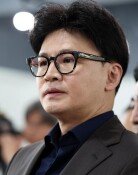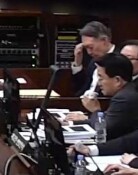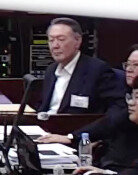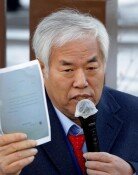Rival Parties Grill Finance Minister at Gov`t Audit
Rival Parties Grill Finance Minister at Gov`t Audit
Posted October. 13, 2009 08:50,
Financial soundness was the hottest debated issue at the parliamentary audit of the Strategy and Finance Ministry yesterday.
Both ruling and opposition party lawmakers asked sharp questions to Strategy and Finance Minister Yoon Jeung-hyun, who responded with details of the governments fiscal policy.
Since people are watching us, I have to explain it right, he said.
Lawmaker Yim Young-ho of the minor conservative Liberty Forward Party said, The national debt under the Lee Myung-bak administration will increase 200 trillion won (170.9 billion U.S. dollars). The share of financial debt will drop from 57.5 percent (at the end of 2007) to 48 percent by 2012, while that of the deficit debt will rise to 52 percent.
The share of deficit debt at the end of the Roh Moo-hyun administration in 2007 was 42.5 percent. Wasnt that much better?
Financial debt can be repaid by collecting loans while deficit debt requires taxpayers money.
Yoon said, We devised policies to overcome the unprecedented economic crisis that erupted last year, so government debt was destined to rise.
Preventing Yim from interrupting as he tried to explain further, Yoon said, People are watching us. Since they should know the right thing, I have to explain it accurately.
Given the debt amount in the overall economy, the world recognizes that Korea is sounder (financially) than any other country.
The ministry said this years government debt will reach 366 trillion won (313 billion dollars) or 35.6 percent of GDP. The International Monetary Fund forecast the ratio of government debt to GDP will be 88.8 percent in the U.S. and 217.4 percent in Japan at years end.
Certain lawmakers said national debt is rising too fast, however. Ruling Grand National Party lawmaker Cheong Yang-seog said, The analysis of national debt increases of OECD member countries ranks Korea fourth at 17.7 percent between 2006 and 2010, but the figure will top 30.6 percent between 2009 and 2010, 2.5 times the average of 12.6 percent.
Another debate questioned whether the debt of state-run companies should be seen as national debt. Ruling party lawmaker Kim Song-sik said, The debt of the top ten state-run corporations will rise from 157 trillion won (134 billion dollars) at the end of last year to 302 trillion won (258 billion dollars) in 2012. Their project plans and budget are beyond the control of the National Assembly, like a shadow budget considered national debt and the real national debt.
Main opposition Democratic Party lawmaker Kang Sung-jong said, The Korea Water Resources Corp. joined the project to restore the countrys four major rivers, but this apparently is avoiding criticism that it compromises financial soundness since the debt of state-run corporations is not included in government debt.
In response, Yoon said, Assets are rising along with the debts of state-run corporations, so the debt problem will not be that big. But we will closely monitor their debt by modernizing them.
The debate over financial soundness is likely to linger given the government policy of economic revival and criticism by lawmakers of excessive state spending.
lovesong@donga.com







